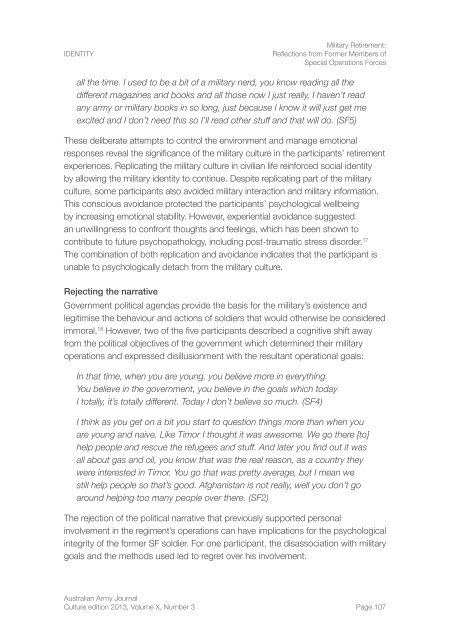Australian Army Journal
Australian Army Journal
Australian Army Journal
Create successful ePaper yourself
Turn your PDF publications into a flip-book with our unique Google optimized e-Paper software.
IDENTITY<br />
Military Retirement:<br />
Reflections from Former Members of<br />
Special Operations Forces<br />
all the time. I used to be a bit of a military nerd, you know reading all the<br />
different magazines and books and all those now I just really, I haven’t read<br />
any army or military books in so long, just because I know it will just get me<br />
excited and I don’t need this so I’ll read other stuff and that will do. (SF5)<br />
These deliberate attempts to control the environment and manage emotional<br />
responses reveal the significance of the military culture in the participants’ retirement<br />
experiences. Replicating the military culture in civilian life reinforced social identity<br />
by allowing the military identity to continue. Despite replicating part of the military<br />
culture, some participants also avoided military interaction and military information.<br />
This conscious avoidance protected the participants’ psychological wellbeing<br />
by increasing emotional stability. However, experiential avoidance suggested<br />
an unwillingness to confront thoughts and feelings, which has been shown to<br />
contribute to future psychopathology, including post-traumatic stress disorder. 17<br />
The combination of both replication and avoidance indicates that the participant is<br />
unable to psychologically detach from the military culture.<br />
Rejecting the narrative<br />
Government political agendas provide the basis for the military’s existence and<br />
legitimise the behaviour and actions of soldiers that would otherwise be considered<br />
immoral. 18 However, two of the five participants described a cognitive shift away<br />
from the political objectives of the government which determined their military<br />
operations and expressed disillusionment with the resultant operational goals:<br />
In that time, when you are young, you believe more in everything.<br />
You believe in the government, you believe in the goals which today<br />
I totally, it’s totally different. Today I don’t believe so much. (SF4)<br />
I think as you get on a bit you start to question things more than when you<br />
are young and naive. Like Timor I thought it was awesome. We go there [to]<br />
help people and rescue the refugees and stuff. And later you find out it was<br />
all about gas and oil, you know that was the real reason, as a country they<br />
were interested in Timor. You go that was pretty average, but I mean we<br />
still help people so that’s good. Afghanistan is not really, well you don’t go<br />
around helping too many people over there. (SF2)<br />
The rejection of the political narrative that previously supported personal<br />
involvement in the regiment’s operations can have implications for the psychological<br />
integrity of the former SF soldier. For one participant, the disassociation with military<br />
goals and the methods used led to regret over his involvement.<br />
<strong>Australian</strong> <strong>Army</strong> <strong>Journal</strong><br />
Culture edition 2013, Volume X, Number 3 Page 107

















